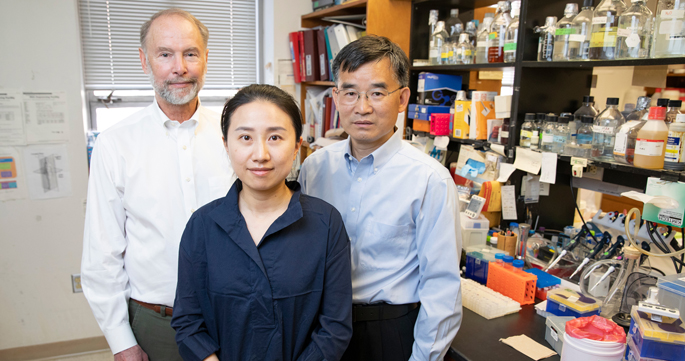More than a decade after the anti-inflammatory drugs Vioxx and Bextra were pulled from the market because of a heightened risk of heart attack and stroke in some patients, COX-2 inhibitors may be on the verge of a comeback, this time as anti-cancer agents.
That’s due in part to the persistence of researchers at Vanderbilt University School of Medicine, who previously demonstrated that they can “light up” tumor cells expressing the COX-2 enzyme in mice with “conjugated” compounds they’ve developed.
In their latest study, published recently in ACS Chemical Biology, they show that they also can slow down tumor growth.
First, a toxic compound is chemically “tethered” to indomethacin, a nonsteroidal anti-inflammatory drug (NSAID), via conjugate-forming alkyl ester or amide bonds. The resulting conjugate, which binds COX-2 selectively and strongly, is then injected into mice that have been implanted with COX-2 expressing human tumors.
Like a heat-seeking missile, indomethacin slides into tumor cells, aiming for the enzyme, and pulls its tethered toxin cargo in with it. Further testing is needed, but this approach potentially could improve treatment of a wide range of tumors that express COX-2, particularly early-stage cancer.
The Vanderbilt findings provide “proof-of-concept that targeting an antitumor agent to an intracellular protein may increase antitumor selectivity and improve the therapeutic window for treating naturally occurring cancers,” said first author Jashim Uddin, Ph.D., research associate professor of Biochemistry.
Uddin and his colleagues linked indomethacin to podophyllotoxin, a member of a family of plant-derived compounds that have anti-cancer activity. The conjugate, which they named “chemocoxib A,” reduced growth of COX-2 positive tumors in mice by 50 percent, but didn’t have any effect on tumors that didn’t express the enzyme.
Podophyllotoxin does not inhibit COX-2, but when tethered to a drug that does, it accumulates in enzyme-expressing cancer cells. How chemocoxib A slows growth of these cells is not well understood, but it did not cause systemic toxicity in the animals, suggesting that it may not harm normal cells.
“We’re one of the first groups to show that you can deliver something to an intracellular target … that’s broadly distributed across many tumors, “ said senior author Lawrence Marnett, Ph.D., dean of Basic Sciences and University Professor of Biochemistry and Chemistry.
If COX-2 inhibitors regain favor, “it’s going to be in cancer,” Marnett predicted.
Conjugates developed at Vanderbilt and elsewhere may add to the rapidly growing armamentarium of “tailored” diagnostics and therapies that are being given to patients according to the unique genetic and biochemical makeup of their tumors, he said.
The research was supported in part by National Institutes of Health grants CA089450, GM103403 and RR029205.















